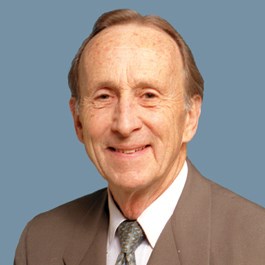5 minutes with... Thomas P. Sullivan
 When did you decide to become a lawyer? Why?
When did you decide to become a lawyer? Why?
As an out-of-state student in a small college in Iowa, 1948-49, I was getting little out of my education, and had no particular goal in view. Then I took a semester course in federal constitutional law, which fascinated me. Accordingly, I applied for and was accepted for admission to Loyola University Law School in Chicago, beginning fall 1949.
Starting out, what did you expect from a career in the law?
At the time of my admission to law school, I knew no lawyers, and had no expectations from a career in law.
Has it lived up to your expectations?
My legal career has proven very satisfactory and fulfilling.
How did you get into the areas of law you are known for today? By design? Chance? Both?
After graduating from Loyola Law in 1952, I was drafted into the Army, and served for two years, including a year in Korea. After discharge in the fall of 1954, I applied to several Chicago law firms, and was hired as the 30th lawyer at the firm then known as Johnston, Thompson, Raymond & Mayer, and now Jenner & Block. I was assigned to the litigation department, although I had not taken a course in trial practice, or ever been in court. This occurred largely by chance.
What do you consider to have been your big break?
The privilege of becoming friends and practicing with a great many excellent lawyers, including my so-called “brother in law” Prentice H Marshall, who later served on the District Court for the Northern District of Illinois, and my “father in law” Albert E Jenner, Jr, one of the leading trial and appellate lawyers in the country.
"Litigation practice requires great attention to details. Litigation deals more with facts than law."
What differences do you see in today's legal market compared to when you started?
Fundamental changes in the way “the practice” is now conducted have come about owing in large part to the building of extraordinarily large firms with multiple offices – for example, Jenner & Block was considered one of Chicago’s larger firms when I joined; it now has over 430 lawyers located in four cities. Also, during most of the time I’ve practiced, solicitation of clients and direct advertising were prohibited as unethical, and could result in disbarment. Most of those restrictions have been removed, giving rise to an entirely different and very aggressive approach among many lawyers regarding the acquisition of clients.
What achievement are you most proud of?
Representing indigent persons who otherwise would not have access to competent legal counsel; assisting in ridding the country of the House Un-American Activities Committee, and Illinois of capital punishment; serving as United States Attorney for the Northern District of Illinois; instituting the so-called Greylord investigation of certain members of the Cook County judiciary; assisting in the passage of state legislation and Supreme Court rules requiring that custodial interrogations of felony suspects be electronically recorded.
What have you enjoyed most during your career in the legal profession?
I have enjoyed assisting people who needed help with legal problems, and close friendships with fellow professionals.
What law would you change, abolish or create?
I favor laws requiring all investigative agents in all states (police, sheriffs), and all federal agencies, to electronically record their custodial interrogations of persons suspected of felony offenses, subject to appropriate exceptions. I also favor laws requiring that eyewitness identifications be made using “blind methods”, either by having the process administered by a person who does not know the identity of the suspect, or who is unable to see which picture the eyewitness is viewing; and that, if practicable, the entire process be videotaped.
Who is your legal hero?
There are many. One surely is Jane E Raley, Co-Executive Director of the Center on Wrongful Convictions of Northwestern University’s Bluhm Legal Clinic, for her years of quietly and effectively assisting persons accused and sometimes convicted of crimes, often for crimes they did not commit.
What advice would you give to students who hope to ultimately get into the areas of law in which you are expert?
Litigation practice requires great attention to details. Litigation deals more with facts than law – past facts, largely unrecorded, developed from the memories and testimony of witnesses. Be prepared to do lots of reading, writing, interviewing, discussing, listening, arguing, and preparing courses of action for meetings with clients, opposing counsel, judges and juries.